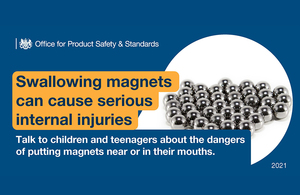OPSS raises awareness on magnets safety
OPSS is raising awareness of the dangers of swallowing small high-powered magnets.

The Office for Product Safety and Standards (OPSS) is partnering with The Chartered Trading Standards Institute, Royal Society for the Prevention of Accidents, Child Accident Prevention Trust, British Retail Consortium, British Toy and Hobby Association, and partners within the NHS to produce magnets safety messages on how to keep children and teenagers safe.
The public are encouraged to support the magnets safety messages by retweeting and posting them on social media, using the hashtag #magnetsafety, or sharing our campaign materials.
How to keep children safe
Check your home
If you have toys or adult desk toys with small magnets, a magnetic sphere construction set, or keep magnets on your fridge, then move them out of the reach of small children. If a toy is faulty and magnets have come loose, get it fixed or dispose of it safely. Don’t attach magnets to glassware as they can become loose and then easily swallowed. Report any product that you think is unsafe to your local Trading Standards team.
Talk to children about the dangers
Using magnetic products as fake piercings, on the tongue, mouth or nose, increases the risk of inhalation or ingestion. Discuss with children and teenagers why small high-powered magnets are dangerous, and why they shouldn’t use them as fake piercings on their body, or as decorative items on glassware.
If you suspect your child has swallowed magnets
If you think your child has swallowed a magnet, take them straight to the nearest A&E or call 999 for an ambulance.
Symptoms may not be obvious. Your child might:
- have stomach pain
- be vomiting
- have a fever
- be pointing to their throat or stomach
Unclear or fluctuating symptoms mean it’s important to be vigilant.
Download digital images for use on social media from our My Safety: Magnets guidance page